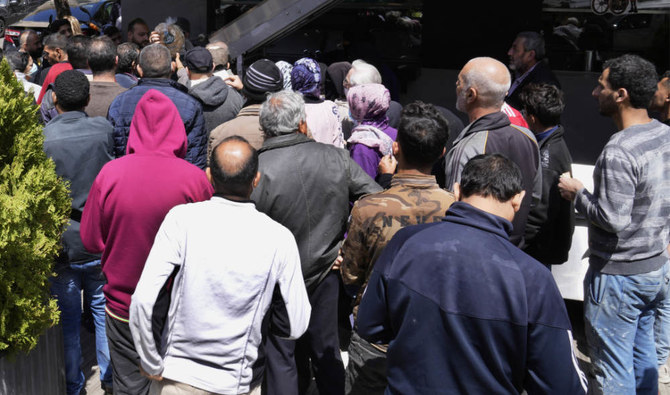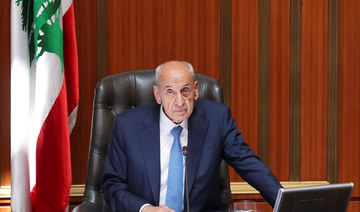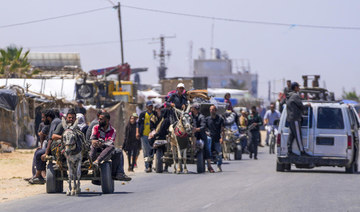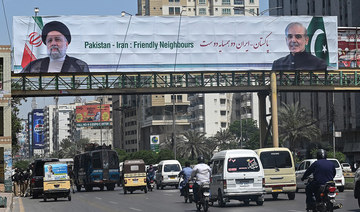BEIRUT: In recent weeks in Lebanon there has been a series of violent assaults and other crimes committed by Lebanese people against Syrian refugees and vice versa.
The attacks have resulted in an increase in discriminatory rhetoric targeting Syrian refugees in Lebanon, while popular support for their repatriation to Syria has also gained momentum as the situation in Syria is widely perceived to have improved sufficiently to allow the refugees to return home.
Indeed, the country’s caretaker prime minister, Najib Mikati, recently threatened to “adopt an undesirable stance toward the Western countries, by illegally repatriating the refugees (if) the international community doesn’t cooperate.”
The UN High Commissioner for Refugees in Lebanon has strongly defended the refugees.
In a statement, the UNHCR expressed its “grave concern over the restrictive practices and discriminatory measures activated on the basis of nationality, which affects the refugees and other marginalized groups.”
HIGHLIGHT
Lebanese officials have started to claim that Syrian refugees are partially responsible for the critical shortage of bread in the country, as they have been consuming large amounts of subsidized wheat
The UNHCR spoke of “increased tensions between different groups, especially violence against refugees, which leads to escalating violent acts on the ground in many districts and neighborhoods.”
It said the economic crisis in Lebanon “is affecting everyone terribly, especially the most vulnerable,” and warned Lebanese authorities that “the ongoing support provided by the international community to Lebanon — which hosts the refugees — is a very important matter that ensures food security and other necessary needs.”
The UNHCR asked the Lebanese authorities to “ensure the rule of law and promptly stop violence and discrimination targeting those residing on Lebanese territory.”
There are an estimated 1.5 million Syrian refugees residing in Lebanon, 900,000 of whom are registered by the UNHCR as refugees living in camps. The vast majority of Syrian refugees in Lebanon are facing extremely difficult living conditions, whether they are in the camps or living and working in the country.
The situation appears to be worsening too: Lebanese officials have started to claim that Syrian refugees are partially responsible for the critical shortage of bread in the country, as they have been consuming large amounts of subsidized wheat.
Some bakeries in regions with Syrian refugees have resorted to segregation, forcing refugees to show their IDs and wait in long queues separated from other customers. When they do get served, they are only allowed a single packet of bread per family, as some Syrian refugees have been accused of sending their children to bakeries to purchase bread which they were then reselling on the black market.
Maher Al-Masri, a coordinator at the Arsal camps in Lebanon’s northern Bekaa region by the Syrian border, painted a brighter picture, saying: “We share the same food with the Lebanese in the region that is hosting us and if something bad happens to the refugees, the Lebanese residents of Arsal rush to diffuse the situation.”
But one of the camps’ officials said: “We are no longer going to bakeries to buy bread. We now buy flour and bake our bread in the camp to avoid coming into contact with the Lebanese anger.”
The Lebanese Progressive Socialist Party warned that “the worrying escalation of such problems might lead to dangerous options that widen the social gaps and increase poverty and racism.”
That already seems to be happening. On Friday, a Lebanese man was stabbed to death by Syrian refugees in Jnah, Beirut, after an argument. Another Lebanese man was killed on July 19 in Mirna Chalouhi. He was stabbed 19 times. They said the victim was killed by “Syrian refugees who accused him of having physical relations with one of the Syrian refugee women.”
Social-media platforms were flooded with inflammatory comments demanding the repatriation of Syrian refugees. But it later transpired that the killer was, in fact, Lebanese and a friend of the deceased, whom he reportedly murdered because of a family dispute.
On July 21, a 13-year-old Syrian boy, Khaled Hammoud Al-Saleh, was killed after being assaulted by a Lebanese man and his sons in the southern region of Sarafand.
On July 24, a camp in the northern Lebanese region of Akkar was set on fire by family members of 43-year-old Diab Khouweilid, a father of seven, whose body was discovered on the seashore in Qlayaat after he had been missing for two days. His family suspected that one or more of the camp’s residents had information about Khouweilid’s death.
The fire affected 85 of the camp’s 90 tents and the camp’s inhabitants were forced to leave to prevent further violence. Most of them lost their belongings.
Lebanon’s caretaker minister of the displaced, Issam Charafeddine, is set to visit Damascus to discuss the plan to repatriate Syrian refugees. Charafeddine said the plan is to repatriate 15,000 refugees every month, despite warnings from international organizations against coercive repatriation after reports of crimes against a number of repatriated refugees.
Syrian activists for refugees in Lebanon, said in a statement: “Refugees in host regions avoid tensions. Syrian refugees are suffering from the economic crisis in Lebanon, similar to the Lebanese. The issue of repatriation awaits practical solutions. We hear of calls and statements made by Lebanese officials, but we haven’t been notified of anything yet by the UNHCR.”

























